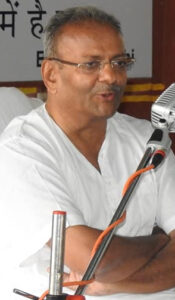પ્રેમનાં મોતીને પુષ્પની પ્યાલીથી ભરાવી આવ;
એ છે પ્રેમનો સવાલ, જરાક નજીક તો આવ.
હૃદય ધબકે છે દૂર રહીને, વાતડી લઈ આવ;
એ મનની વાતને પ્રીતડી સંગ નિભાવી આવ.
તારા હોવાના અહેસાસનો સ્પર્શ કરાવી લાવ;
સંગાથે રહી જીવનભર, સાથી બનીને ચાલ.
હાથમાં રહેલ મહેંદીમાં મારું નામ લખાવી આવ;
મહીં પ્રીતડીના રંગ, એ સુંદરતાને વધારી લાવ.
પ્રીતના પાનેતરની લીલી ચૂંદડી લહેરાવી આલ;
માથે ઓઢી ઘૂંઘટ, લાજને જરા સરકાવી લાવ.
રાખી હાથ મારા હાથે, વચનને માની હાલ;
પ્રેમના આંગણે સૂર્યના તેજથી ચમકી લાવ.
પ્રેમનાં મોતીને પુષ્પની પ્યાલીથી ભરાવી આવ;
એ છે પ્રેમનો સવાલ, જરાક નજીક તો આવ.
ભુજ કચ્છ
e.mail : julisolanki110@gmail.com
![]()



